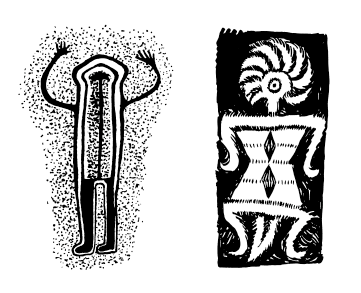Part 2: Is Pronoia Just for Rich, Comfortable People?
Pronoia Is the Antidote for Paranoia)

On many of the mornings when I wake up in my soft bed, surrounded by the perks of my temperaturecontrolled home and ready to enjoy another mysteriously interesting day, I am visited by the urge to murmur a prayer of gratitude like "Thank you a billion and one times, Whoever or Whatever You are that gave me this lavish riot of beauty." I am flooded with ecstatic appreciation as I taste the honey mingle with the sour flesh of the organic grapefruit, or when my lover cracks a quirky joke right before she kisses me twice, once on each eyelid, or when my daughter emails me the enigmatic new poem she wrote.
But what brings me even sharper pangs of personal elation, what evokes an even more exuberant longing to celebrate, are those moments when I deeply feel the successes that are unfolding for human beings far away from me -- successes like the irrevocable decline of global poverty and child mortality (discussed in Part 1 of this series: http://bit.ly/RichComfy).
And I know many people who nurture a similar aim. Our numbers are growing. Before now, there has never before been a time when so many people have actively cultivated a capacity for transcendental empathy. Before now, there has never before been a time when millions and millions of us have taken concrete action to improve the well-being of those we've never met. We are currently living in the most compassionate moment in the history of civilization.
In his well-researched book *Blessed Unrest: How the Largest Movement in the World Came into Being and Why No One Saw It Coming,* Paul Hawken argues that organized political action devoted to advancing the rights of other people is a relatively new phenomenon, less than 200 years old. The drive to abolish slavery was where it began. In recent decades it has grown exponentially, becoming a global crusade to improve social justice, economic conditions, human rights, and environmental health. We take it for granted, but it is a surprising and unprecedented development.
By Hawken's estimates, there are well over a million organizations engaged in the effort, which thrives without centralized leadership, charismatic front men, or a fixed ideology. Because of its grass-roots ubiquity, it is largely invisible to the mass media and underestimated by politicians.
Some day, maybe 500 years from now, our descendants will have installed the art and science of universal compassion as the first law of civilization. And I bet they will give honor to us, the people alive on the planet today, as the heroes who gave critical mass to their prime directive.
+
For those who are dogmatically predisposed to thinking that the world is a hellhole, no amount of contrary evidence will change their minds. The cynic who asked me the following question didn't really want an answer: "Tell me how your pronoia explains a child in Darfur starving to death after watching soldiers kill his mommy?"
While I don't claim to have the authoritative response to that accusation, I think it's worthwhile to consider the possibility that suffering is, among other things, a difficult gift we humans are given in order to prod our evolution.
On a personal level, our longing to escape our suffering is a primal force in making us smarter. On a collective level, nothing refines and ennobles us more than our passion to keep others from suffering. For every dead child in Darfur, 100 people in other places on the planet have responded with a commitment to create a world in which future Darfurs won't happen.
+
Read Part One of the series.
Prayer for Us
Pronoia therapy
Prayer Warriors Standing By
Listen to Rob's Expanded Audio horoscopes, updated weekly.
Pronoia therapy
Prayer Warriors Standing By
Listen to Rob's Expanded Audio horoscopes, updated weekly.

